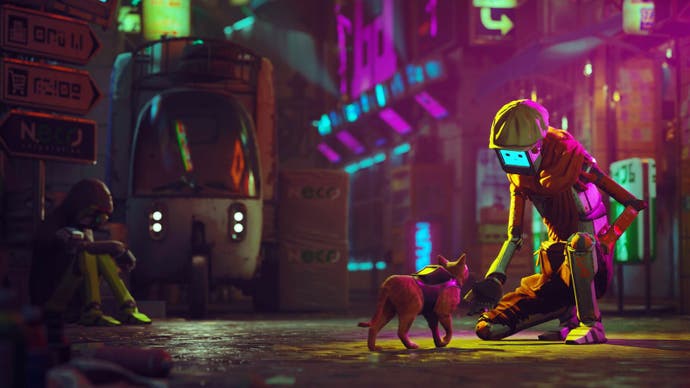Games are starting to understand there's more to wildlife than hunting
Can I pet the eagle?
Arthur Morgan sets off on a hunting expedition along the banks of the Upper Montana River to gather the provisions needed to feed the whole Van Der Linde gang. He spots the perfect prey: a whitetail deer, with its head down drinking water from the river’s edge. He unsaddles from his trusty horse, equipping his bow and grabbing several arrows upon landing. He initiates hunting mode, stealthily stalking his prey from downwind, until he reaches optimal distance, slipping into cover behind a tree.
Arthur carefully draws an arrow from his quiver, notching it to his bow and slowly applying tension to the bow string. He focuses on making a clean kill, nailing the heart of the whitetail deer. He releases his bow string. The arrow whistles through the air. Suddenly something startles the deer, causing the arrow to miss the heart, instead plunging into the lungs. We hear the pained heart-wrenching grunts of the wounded deer. Arthur trudges over, unsheathing his knife. He compassionately puts the animal out of its misery. The Van Der Linde gang will be well fed for a few days. However, as a player, this hunting activity made me re-evaluate my views on the relationship between video games and the wild.
Even as a child, I've always had an affinity with animals and nature. A lot of this came from learning about dinosaurs. Who wouldn't be astonished to know that gigantic reptiles roamed the Earth millions of years ago? I've always known that animals are integral to the world and need to be protected.
Red Dead Redemption 2 was revolutionary for me, because it was the first open-world game where the animals and ecosystem felt real. The graphical realism allowed me to experience nature without the limitations of my disability: the main hook for me was exploration and enjoying my own experience with the game outside of the main narrative. I spent hours tracking down animals, dying from wolf pack ambushes, stupidly running into the jaws of a crocodile or standing on cliff edges, trying to locate an elusive Bald Eagle. All in order to finally complete the comprehensive compendium.
The negative aspect of that realism for me was the graphic act of skinning animals. It just looked and felt too real. The amount of detail in the skinning process became unpleasant to watch, especially with larger animals, due to the increased length of the process. In the first Red Dead Redemption, I did not have an issue with hunting activities due to the graphics not being powerful enough to replicate anything close to reality. Red Dead 2 meant that I could not look away.
Elsewhere, The Last Of Us Part 2 similarly affected me when dogs were introduced as enemies. I always tried to sneak around them, however I inevitably ended up having to kill some due to unskilful stealth. When it happened for the first time, I had to pause the game to process emotions of guilt and accountability for my actions. Why should I feel accountable for my actions? It's just a game, right? With realism of this fidelity, though, it's difficult to justify to yourself that your actions are only in a game. You hear realistic sounds of an animal in pain or owners calling out the names of their dog, and it triggers actual emotions: empathy and an aversion to causing that pain again.
Happily, I recently played Alba: A Wildlife Adventure, such a wholesome game about celebrating the natural world and highlighting the message of taking care and respecting the planet. As the young protagonist Alba, you are given a camera to take pictures of birds you discover whilst exploring a small open world. It was such a joy to play, as I felt connected with the birds. In other games, I'd just see birds as feathers useful for creating arrows! It highlighted an internal dilemma I have with how nature is portrayed in games. Inevitably, open-world games have to restrict the way in which players can interact with the world. That's why most interactions with animals revolve around hunting, turning nature into a commodity to be exploited to benefit us.
However, there is a big shift happening. Think of that one wish so many players have in games with dog companions: I want to pet the dog! Is this spreading further? Far Cry 6 allowed you to bond with multiple pet amigos, and one of the cutest choices was Chorizo the Dachshund with wheels for back legs. It's impossible not to want to pet him or call him a good boy after he helped you set up an ambush on Anton Castillo’s soldiers.
The highly anticipated Bethesda game Starfield is an ambitious space RPG with 1000 colony worlds to explore. The gameplay reveal showed us the mysterious rocky moon Kreet, with different alien creatures in the environment. This made me contemplate whether your character would be able to scan or gain an understanding about the creatures, if you could choose a xenobiologist background. This would increase immersion and investment with different planet ecologies instead of generically viewing all creatures as enemies or commodities, wouldn't it?
Then there's something like Stray. What a fantastic concept. You explore a decaying cybercity through the eyes of a cat as you untangle an ancient mystery. Stray gifts the player a unique four-pawed perspective of environmental navigation, and the opportunity to perceive and interact with the world as a feline. I think that more games should have animal protagonists. It gives us the chance to celebrate animals through the medium of gaming, and the added empathy only improves our appreciation of nature. Stray's approach makes sense. Animals give us so much joy in both the real world and in gaming worlds, so more games should be focused on providing deeper interactions with animals, instead of just viewing them through the lens of hunting activities.



